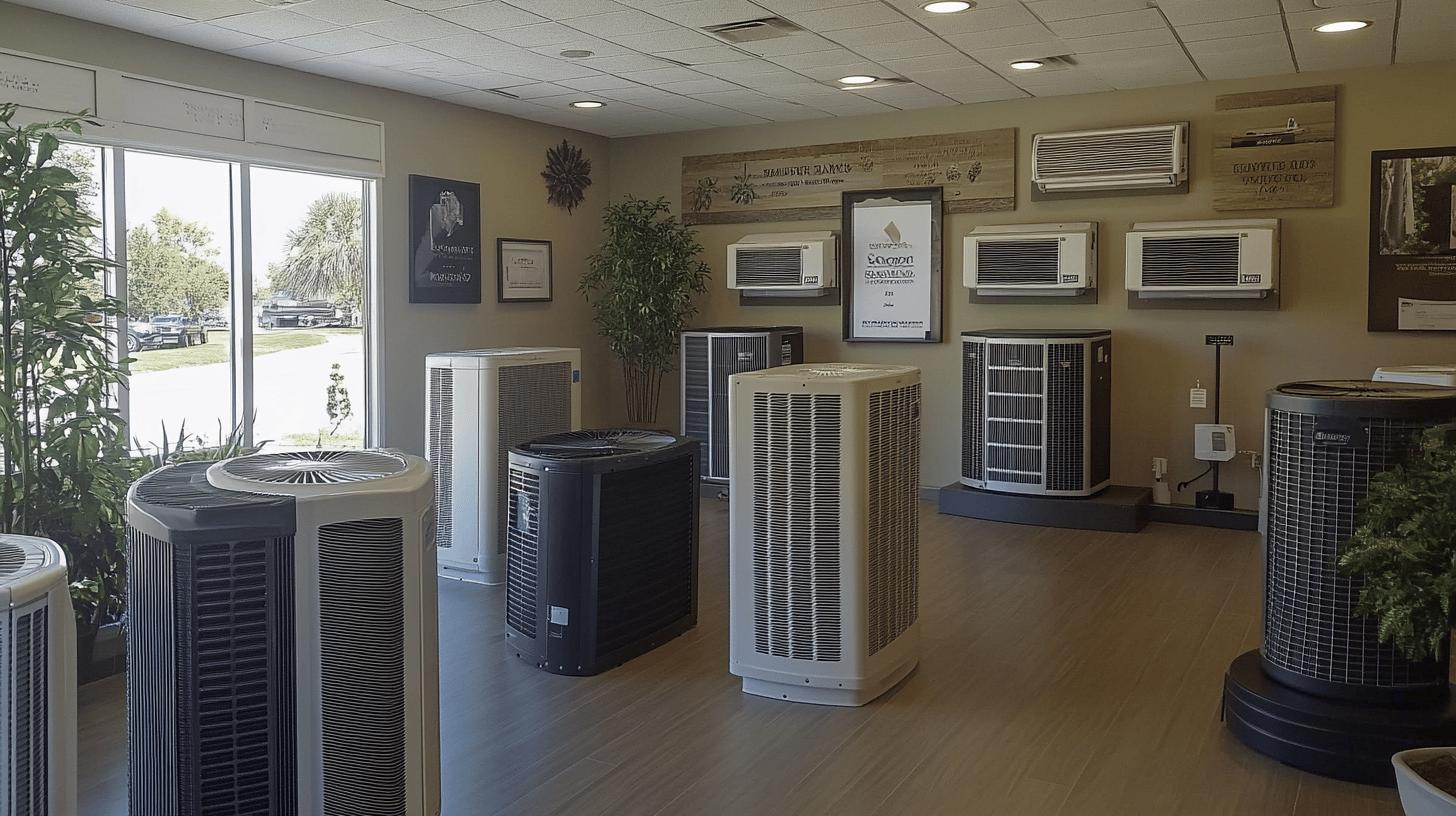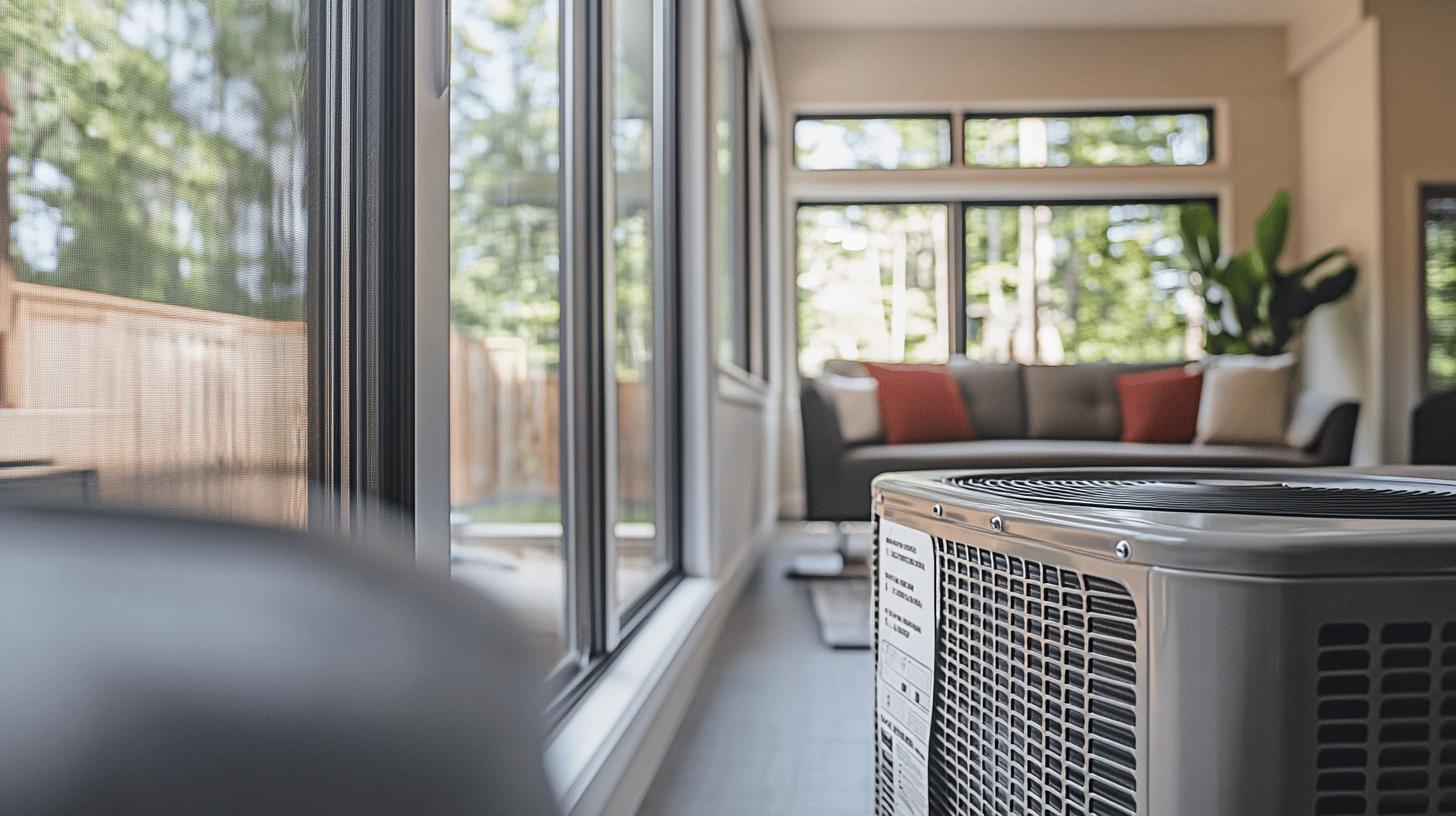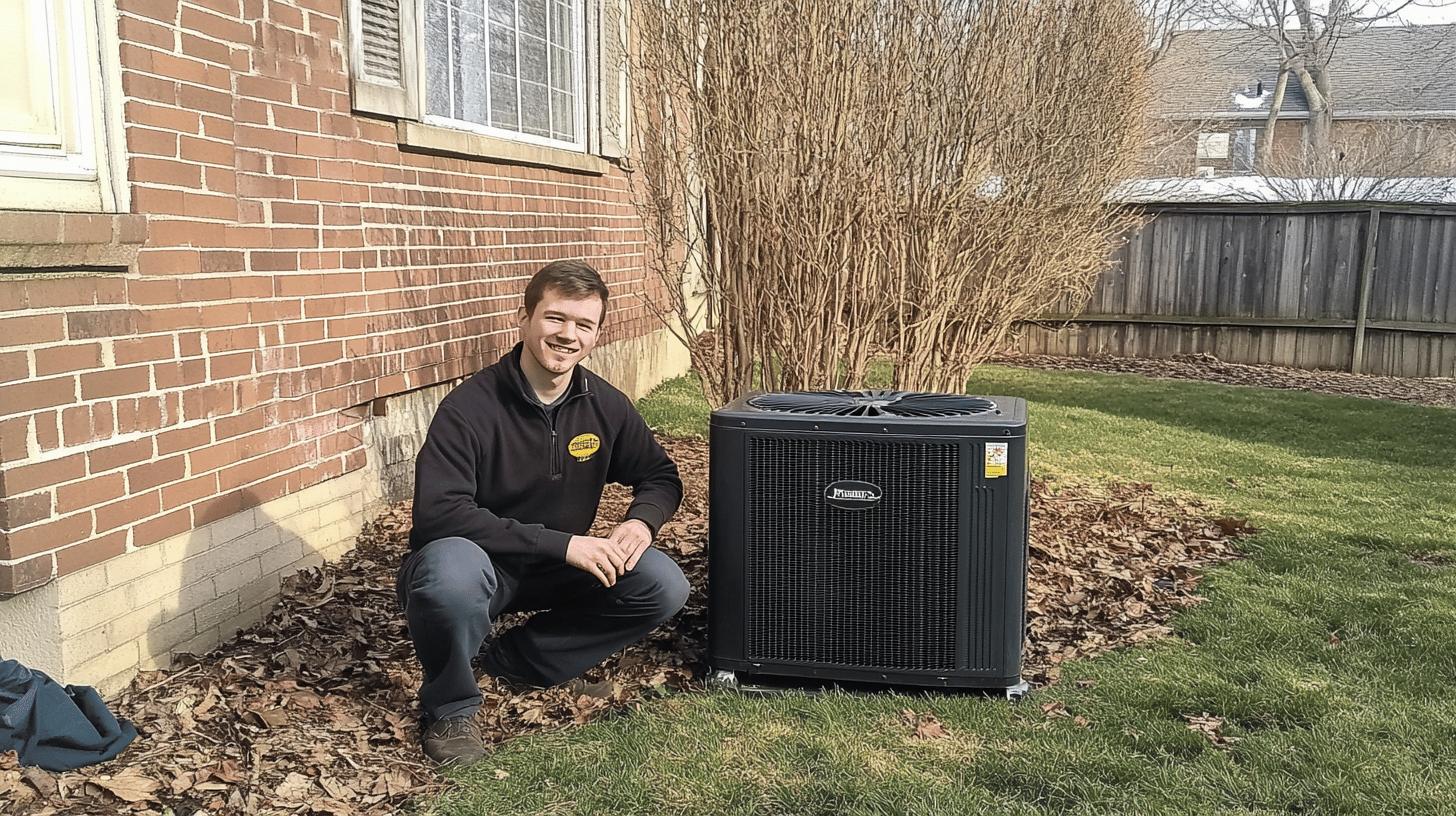TL;DR:
- HVAC systems include furnaces, air conditioners, heat pumps, ducts, and thermostats.
- They account for over 50% of a home’s energy use, impacting comfort and costs.
- Types: Split System, Hybrid Split, Duct-Free Mini-Split, Packaged System, Zoned System.
- Installation costs can range from $3,000 to over $10,000; additional costs may apply for permits and upgrades.
- Efficiency ratings: SEER (cooling), EER (cooling), AFUE (furnaces), HSPF (heat pumps); higher ratings equal better efficiency.
- Maintenance tips: change filters every 1-3 months, inspect ducts, schedule professional checks, and clean outdoor units.
- Consult HVAC contractors for proper system sizing and installation to maximize efficiency.
Ready to make your home more comfortable and save on energy bills? HVAC systems are key to keeping your home at the right temperature, but they also use a lot of energy—sometimes more than half of your total usage. Understanding how they work and why getting them installed and maintained by pros matters can help you save energy and keep your home cozy all year long. Let’s dive into what makes HVAC systems tick and how to make them work better for you.
Understanding HVAC Systems for Homes
HVAC systems are essential for keeping your home comfortable, providing heating, ventilation, and air conditioning. They consist of components like furnaces, air conditioners, heat pumps, ducts, and thermostats, each playing a part in maintaining a cozy indoor temperature year-round. Furnaces and air conditioners control heating and cooling, ducts distribute the air, and thermostats keep everything running smoothly.
These systems use a lot of energy—often more than half of your home’s total energy use. That makes them a major factor in both comfort and energy bills. Efficient HVAC systems help lower energy consumption, saving you money and reducing environmental impact. By opting for energy-efficient models, homeowners can enjoy a comfortable home while cutting down on energy costs.
Professional installation and regular maintenance are key to getting the most out of your HVAC system. Proper installation ensures everything fits and works correctly, boosting efficiency and lifespan. Regular maintenance helps identify potential issues early, ensuring your system runs smoothly and lasts longer. Relying on pros for installation and maintenance guarantees a dependable system that keeps your home comfortable.
Types of HVAC Systems for Homes

Knowing the different types of HVAC systems can help you choose the best one for your home. Ducted systems, like split and hybrid systems, are common in many homes. Split systems have separate indoor and outdoor units and work best in homes with existing ductwork. They efficiently heat and cool the home by circulating air through ducts. Hybrid systems, which use both electric and gas power, are energy-efficient and ideal for homes in areas with varying climates.
What about ductless options? Ductless systems, like mini-splits, don’t require ducts, making them a great choice for homes that don’t have ductwork or for room additions that are hard to connect. These systems let you control the temperature in each room individually, saving energy by adjusting the climate in each space.
Here are five common types of HVAC systems:
- Split System
- Hybrid Split System
- Duct-Free Mini-Split
- Packaged Heating and Cooling
- Zoned System
Choosing the right HVAC system depends on your home’s size, local climate, and energy efficiency goals. It’s a good idea to consult a professional HVAC contractor to get advice on the best system for your needs. Their expertise ensures you get a properly sized system, which helps maximize efficiency and minimize energy costs and potential issues.
Cost Considerations for Installing HVAC Systems
When installing an HVAC system, several cost factors come into play. The size of your home, the complexity of the system, and the amount of ductwork needed all impact installation costs. Larger homes or homes with unique layouts might require bigger or more intricate systems, which can raise expenses.
Additional costs may include permits required by local codes. If your home needs upgrades to the electrical system or insulation to accommodate the new HVAC, that can add to your budget as well. It’s a good idea to factor these extra costs into your planning to avoid surprises.
Here’s a breakdown of typical cost influences for HVAC installation:
| Installation Factor | Estimated Cost |
|———————|————————-|
| System Type | $3,000 – $10,000 |
| Ductwork | $2,000 – $3,000 |
| Location | Varies by region |
| Permits/Upgrades | $500 – $2,000+ |
Consulting professional HVAC contractors is key to getting accurate cost estimates based on your specific needs and location. Their expertise helps cover every aspect of installation, from system selection to setup, preventing unexpected costs and ensuring the entire process runs smoothly.
Comparing Energy Efficiency in HVAC Systems

Energy efficiency is crucial for HVAC systems because it helps lower both energy costs and environmental impact. High-efficiency systems use less energy, which means lower utility bills and a smaller carbon footprint. By improving energy use, these systems save money while also supporting environmental sustainability.
Energy efficiency ratings like SEER, EER, AFUE, and HSPF help measure how well HVAC systems perform. SEER (Seasonal Energy Efficiency Ratio) and EER (Energy Efficiency Ratio) are used for cooling systems—higher ratings indicate better efficiency. AFUE (Annual Fuel Utilization Efficiency) measures how efficiently a furnace uses fuel, and HSPF (Heating Seasonal Performance Factor) evaluates the efficiency of heat pumps. The higher these ratings, the more efficient the system.
How can you boost your HVAC system’s energy efficiency? Consider these tips:
- Use smart thermostats
- Ensure proper installation
- Perform regular maintenance and filter changes
- Choose ENERGY STAR-rated systems
These strategies improve HVAC system efficiency, helping reduce energy use and costs in the long run. Smart thermostats offer accurate temperature control, while proper installation ensures minimal energy loss. Regular maintenance, like filter changes, keeps the system running smoothly. Choosing ENERGY STAR-rated systems ensures high efficiency, delivering better performance and savings.
Maintenance Tips for Home HVAC Systems
Why should you maintain your HVAC system regularly? Regular maintenance helps your system last longer, lowers energy bills, and prevents expensive repairs. Keeping it in good condition ensures it runs efficiently, saving energy and cutting down on utility costs.
What key maintenance tasks should be done? Important tasks include changing filters and scheduling seasonal inspections for both heating and cooling components. Replace filters every 1-3 months to maintain proper airflow and efficiency. Seasonal inspections by professionals catch potential problems early, avoiding costly repairs and ensuring your system runs smoothly year-round.
Here’s an annual maintenance checklist:
- Change filters every 1-3 months
- Inspect ducts for leaks
- Schedule professional HVAC inspections
- Clean outdoor condenser units
Following this checklist helps keep your HVAC system running efficiently and lasting longer. Checking ducts for leaks prevents air from escaping, while professional inspections ensure everything is running smoothly. Cleaning the outdoor condenser unit removes debris, allowing it to operate at its best. Regular maintenance keeps your system working efficiently, providing both comfort and savings.
Selecting the Right HVAC System for Your Home

When choosing an HVAC system, consider the size of your home, the local climate, and your energy efficiency goals. Larger homes often need a more powerful system, while smaller homes may do well with more compact models. The local climate will affect whether you need a stronger heating or cooling system, and aiming for energy efficiency can help save on costs.
It’s important to consult a professional HVAC contractor because they can ensure that your system is correctly sized and properly installed. They’ll assess your home’s insulation, ductwork, and overall needs to recommend the best fit. Their expertise prevents issues like wrong sizing, which can lead to inefficiency and higher costs. Professional installation also guarantees that all components are properly set up to maximize performance and lifespan.
Professional plumbers and HVAC technicians are key to system performance and reliability. They handle expert installation and maintenance, ensuring all parts of the system work together smoothly. Their role doesn’t end after installation—regular check-ups and repairs help prevent problems and keep your system running efficiently for long-term comfort.
Final Words
Exploring HVAC systems for homes shows just how important they are for keeping things comfortable indoors. Each part, from the furnace to the thermostat, plays a key role in maintaining the right temperature. Different systems cater to different needs, with both ducted and ductless options available.
Costs can vary a lot depending on your home’s size and the complexity of ductwork, so it’s important to plan your budget carefully. Energy efficiency ratings help guide your decisions, allowing you to choose systems that cut down on energy costs. Regular maintenance keeps your system running smoothly for years, highlighting the importance of staying proactive.
Choosing the right HVAC system means balancing what your home needs with expert advice. Making informed decisions ensures comfort, efficiency, and a home that’s both cozy and energy-efficient.
FAQ
What are the types of HVAC systems for residential homes?
There are four main types of HVAC systems for homes: split systems, hybrid split systems, duct-free mini-splits, and packaged heating and cooling systems. Each type suits different needs, ensuring comfort and efficiency.
What is the most reliable HVAC brand?
The most reliable HVAC brand can vary based on specific needs and preferences. However, Carrier, Trane, and Lennox consistently receive high marks for reliability and customer satisfaction in reviews and expert recommendations.
What is the typical cost to replace an HVAC system?
The typical cost to replace an HVAC system ranges from $4,000 to $15,000. Costs depend on factors like home size, system type, and additional features. Installing new ductwork can add $2,000 to $3,000.
How big of an HVAC unit do I need for a 2000 sq ft house?
For a 2000 square foot house, you generally need an HVAC unit with a capacity of 3-5 tons, equivalent to 36,000-60,000 BTUs. A professional assessment ensures correct sizing for efficiency and comfort.
What is a heater air conditioner combo wall unit?
A heater air conditioner combo wall unit integrates heating and cooling functions into one appliance, suitable for compact spaces. It offers convenience by addressing temperature control needs in multi-functional settings.
What are the best-rated HVAC systems in Consumer Reports?
Best-rated HVAC systems in Consumer Reports often include brands like Lennox, Carrier, and Trane. These brands consistently score well in efficiency, reliability, and customer satisfaction categories. Check the latest reports for updated recommendations.

